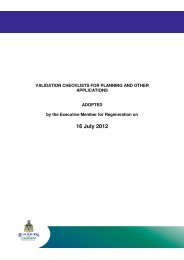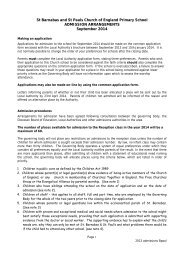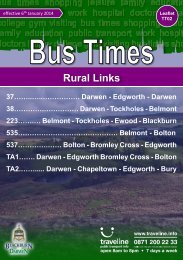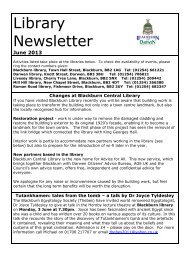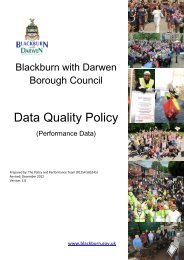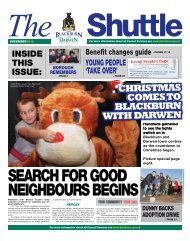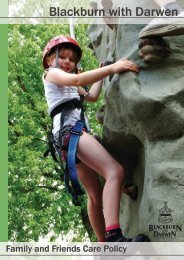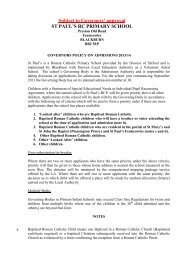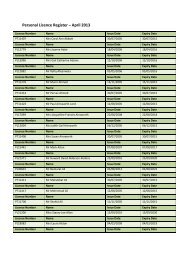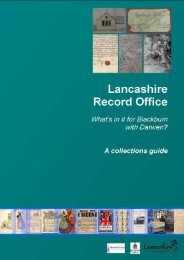Witton Park historical report - Blackburn with Darwen Borough Council
Witton Park historical report - Blackburn with Darwen Borough Council
Witton Park historical report - Blackburn with Darwen Borough Council
Create successful ePaper yourself
Turn your PDF publications into a flip-book with our unique Google optimized e-Paper software.
Assessment of <strong>Witton</strong> <strong>Park</strong> House, <strong>Witton</strong> <strong>Park</strong>, <strong>Blackburn</strong><br />
4.3 Most of the area of the ancient township now lies <strong>with</strong>in <strong>Witton</strong> <strong>Park</strong>,<br />
which was enclosed out of a substantial area of the township when <strong>Witton</strong><br />
House was built at the beginning of the 19 th century. Medieval settlement<br />
<strong>with</strong>in <strong>Witton</strong> township appears to have been entirely rural, mainly<br />
comprising a few farms, but perhaps <strong>with</strong> a small nucleation of properties<br />
eventually growing up around <strong>Witton</strong> Stocks in the south-east corner of<br />
the township. <strong>Witton</strong> Stocks was so-called apparently because this was<br />
the location of the public stocks. 12 Medieval documents record a number<br />
of tenements, or property holdings, from the later medieval period<br />
onwards, but there seem to have been only three principal farms.<br />
4.4 <strong>Witton</strong> Eyes lay on the southern edge of the township between the Rivers<br />
Blackwater and <strong>Darwen</strong>. Its name probably derives from its location<br />
between the two rivers, as Eyes, or Ees means island, land on the edge of<br />
the marsh, or well-watered land. 13 This farm is first documented in 1557,<br />
when it was held by John Cowburne, but as the Cowburnes were already<br />
in possession of an estate in <strong>Witton</strong> by 1404, it is likely that this was also<br />
<strong>Witton</strong> Eyes. 14<br />
4.5 The second major farm holding was Coo Hill, which definitely had<br />
medieval origins. It was known to have been part of the <strong>Witton</strong> manor<br />
estate when it was held by the Holden family in 1387. Records show<br />
several Holdens in possession of lands in <strong>Witton</strong> throughout the 16 th<br />
century, including Thomas Holden who died in possession of Coohyll in<br />
<strong>Witton</strong> in 1591. 15 One Thomas Holden held the farm in 1617, but by 1650<br />
his son was a freeholder. 16 The name Coo Hill is simply derived from a<br />
dialect word, meaning Cow Hill. 17 It later became part of the estate which<br />
was enclosed to form the landscape park to <strong>Witton</strong> House. Following the<br />
creation of <strong>Witton</strong> <strong>Park</strong> as a country park, the eastern section of the<br />
estate, including Coo Hill, was separated and developed as a school and<br />
the farm itself has been demolished.<br />
4.6 The principal farm in the township was <strong>Witton</strong> Hall (SD 6641 2726), which<br />
was referred to in various documents as the capital messuage, or chief<br />
holding of the manor. The hall lay in the southern part of the township, on<br />
the north side of the road from Preston to <strong>Blackburn</strong>. It was probably the<br />
original manor house, but the subsequent descent of the hall and the<br />
manor became separate. The owners of the manor were the de Lacy<br />
family, who were lords of the Honor of Clitheroe, and who granted <strong>Witton</strong><br />
to Hugh, son of Leofwin, and whose nephew, Adam de Billington, held the<br />
12 Abram 1877, 755<br />
13 From the Old English word ēg or īeg; Mills 1991, 381<br />
14 Farrer and Brownbill 1911, 265<br />
15 Abram 1877, 760<br />
16 Farrer and Brownbill 1911, 265<br />
17 Ekwall 1922, 74<br />
Egerton Lea Consultancy Ltd 2009 4




